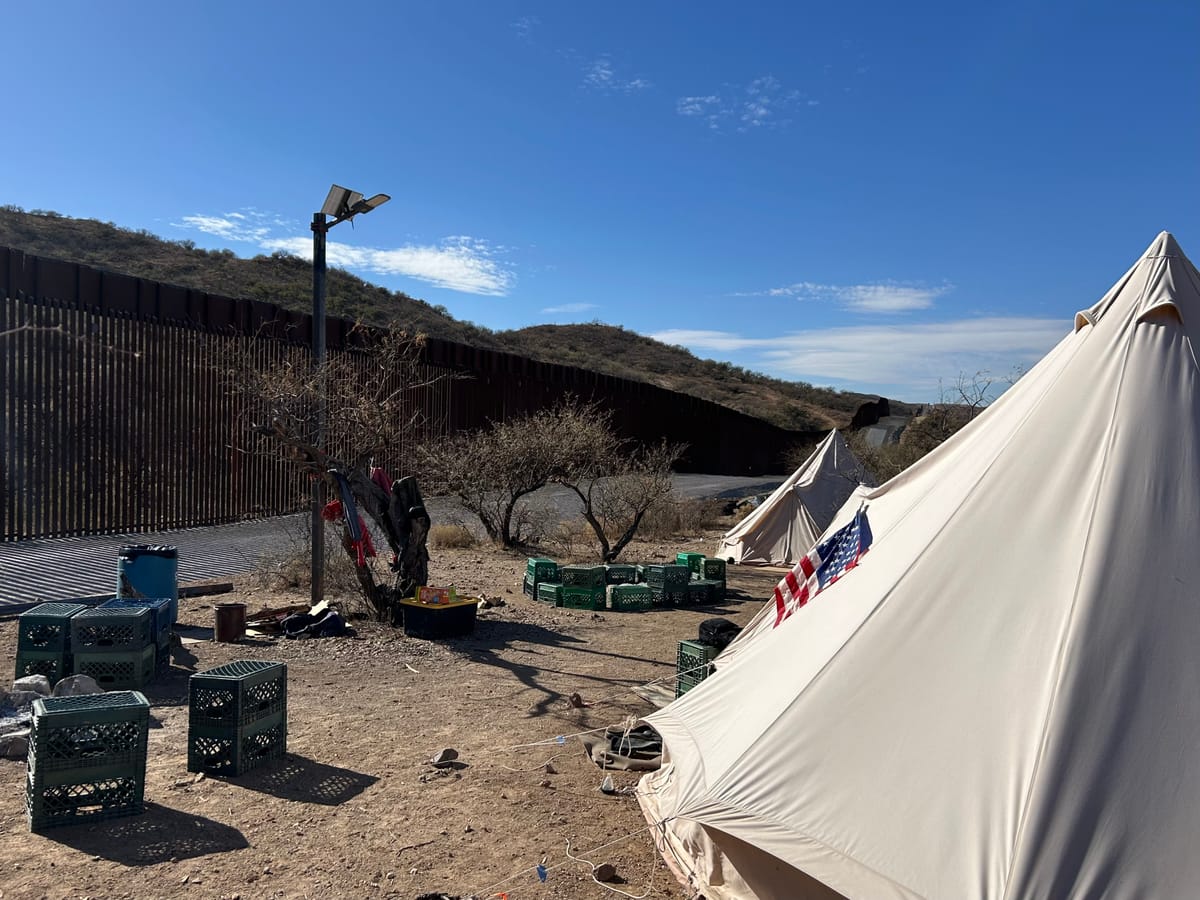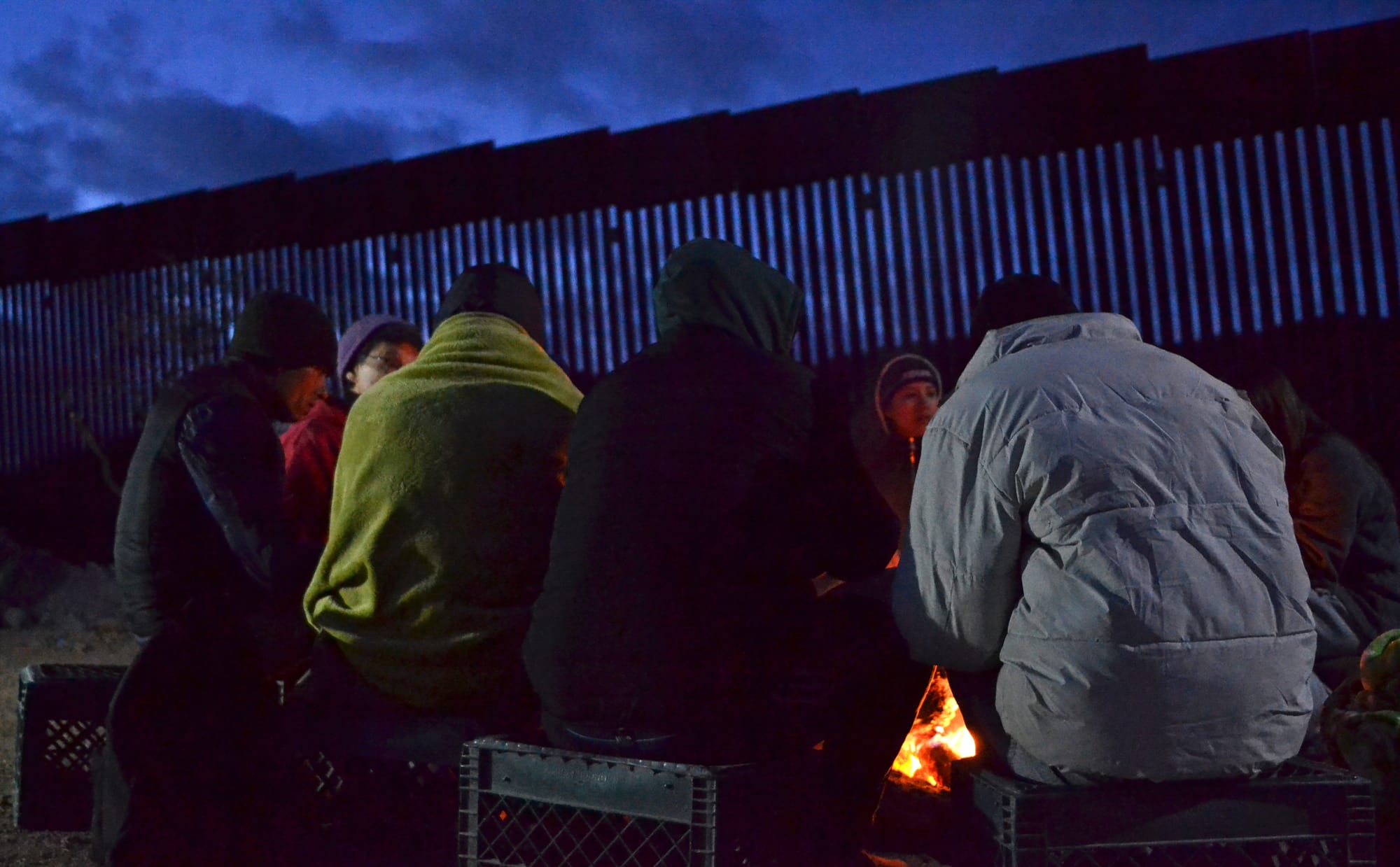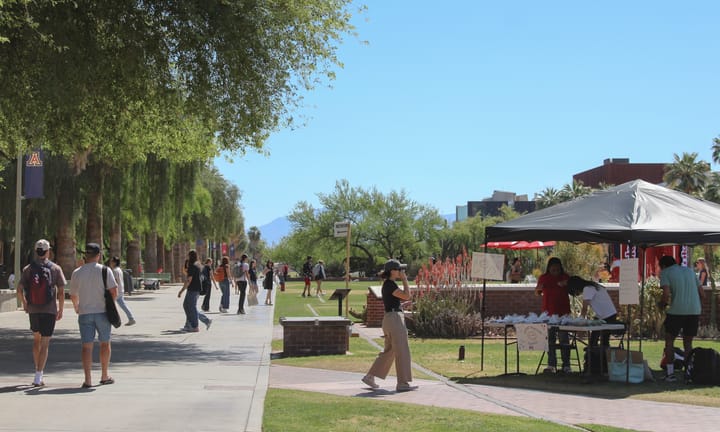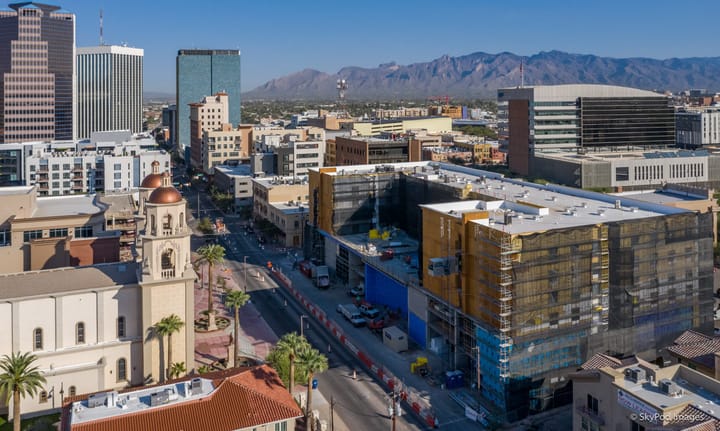Border aid camps dismantled amid federal disputes
Humanitarian groups are dismantling migrant aid camps near Sasabe, citing federal orders that agencies deny, as asylum seekers face deportation and ongoing border challenges.

Humanitarian groups are dismantling migrant camps along the border wall east of Sasabe under what they say are orders from the federal government, although agencies are denying their claims.
A volunteer with the aid group Tucson Samaritans said someone with the U.S. Forest Service, the agency that manages the land on which the encampment sits, told him the camp was a fire hazard and needed to be taken down.
Charlie Cameron, a Samaritan, said the groups were told that orders to clear out the camp were being drafted by the Forest Service on December 18 in an unofficial communication at the border wall.
On December 27, Cameron called the Forest Service spokesperson to further discuss the details of order and was told that “if an order was coming, it would be under the new administration and (that) it was currently being drafted,” though he noted that there hasn’t been any communication from that spokesperson since.
“They said they would tear it down themselves – meaning everything thrown away,” Gail Kocourek, a volunteer with the Tucson Samaritans, told Tucson Spotlight. “That's why we’re slowly taking it out.”
U.S. Forest Service spokeswoman Starr Ferrell said the agency “has taken no action related to humanitarian organizations along the border wall east of Sasabe” and directed border enforcement-related questions to U.S. Customs and Border Protection.
CBP did not respond to Tucson Spotlight’s request for comment.
Regardless of where the order came from, the camps are being taken down, which Spotlight confirmed during a recent visit to the U.S.-Mexico border, about 20 miles from Sasabe, with one of the groups.

At about 3 a.m., eight men walk into a tent at a camp run by humanitarian aid groups, wrap themselves with blankets, and try to fall asleep.
The camp is maintained by various humanitarian organizations including Tucson Samaritans, Green Valley Samaritans, No More Deaths and Humane Borders, among others.
They provide food, clean water, shelter, clothing, a warm fire, and during the early morning hours, coffee, hot chocolate and snacks.
The camp site includes two tents, two firepits, a solar-powered light and dozens of crates used for seating and storage of items like granola bars, apple sauce, feminine care products and diapers.
A portable restroom sits a couple of feet away from the camp, along with tanks filled with water to drink.
“We know that there are plans for the end of the wall here, so what we're doing is reducing our footprint, but still maintaining our effectiveness in anticipation that something will happen,” said Samaritan Charlie Cameron. “Maybe the military will come in and occupy … and prevent people from crossing.”
The camp used to sit right at the end of the wall but has since moved about 50 meters further from the end. It’s also been significantly downsized.
They have long served as a landing spot for migrants who oftentimes travel for months to get to the United States.
Many, like Hugo, come seeking asylum. He came in a group of eight that included another man from Ecuador, a man from Nepal and five men from India.
In Ecuador he is a lawyer and works at a public notary. Hugo’s life was comfortable, but after two homicides — one at a coffee shop near his job and the second, his next door neighbor — he decided he needed to leave, saying he felt his life was in danger.
Hugo said that last year, 15 lawyers were killed in his country.

Ecuador is facing deep-rooted corruption in its judicial system,with judicial staffers facing death threats and the death of the prosecutor handling the case of a live TV studio attack involving organized crime.
“There are very strong mafias at this moment that control Ecuador. They control everything” he said. “The government always tries to paint the best picture in saying that they’ve fought organized crime, but it has been one of the most disastrous governments that the country has had where there have been more deaths, extortions, persecution and kidnappings.”
Ecuador’s homicide rate has surged to 45 in 100,000 people, placing it among the top three most violent Latin American countries, according to Human Rights Watch. The violence is driven by organized crime, with two large gangs fighting for territorial control.
The power struggle has led to “extreme violence, including decapitations and dismemberment, car bombings and attacks on and killings of judges, prosecutors, journalists and political candidates,” according to Human Rights Watch.
While Hugo handled civil cases, he feared for his life because of his profession.
“The situation in our country is unsustainable now. We are persecuted, our lives are at risk,” he said. “Leaving (our country) is also endangering our lives, but (in Ecuador) it is even more dangerous.”
Hugo took a plane to Mexico and walked north to seek asylum in the U.S. He said that crossing through Mexico was one of the most traumatizing experiences of his life
When he’s on the phone with his parents, he tells them everything is fine. But in reality, he said that he would not make the journey again, adding that the cold he experienced in the desert was unlike anything in his country.
His hope is to seek asylum in the U.S.
At 5 a.m. the Samaritans pull up to the camp and immediately get to work setting up a coffee station, feeding the fire, taking tags off gloves and beanies and waking up the asylum seekers to prepare them for what’s to come.
While the Ecuadorian men speak Spanish, neither the man from Nepal nor the men from India understand English or Spanish and are left in the dark with no way to explain to them what happens next.
The camp previously had satellite internet that allowed volunteers to use Google Translate to communicate, but Koucurek said the Forest Service has also stopped them from bringing it out to the camps.
As they all huddled around the fire, the Samaritans asked Hugo and Marcello, the other Ecuadorian, if they knew of the political situation in the U.S.
They explained that the country is no longer processing asylum cases and they will most likely be deported.
Hugo listened attentively as the Samaritan spoke, his face unchanging, but his eyes exhausted.
They also told them what to expect next: that CBP would arrive around 7 a.m., that they would be asked to put their phones in their backpacks and that their belongings would be taken away.
They were told they’d be asked to stand in a line along the border wall, then would be taken to a processing center about 40 minutes away.
Hugo thanked the Samaritans for the gloves, the shelter and the hot chocolate, as volunteers offered the men food while they waited for agents to arrive.
“Unfortunately, I believe that those who come to ask for asylum will not have the opportunity for asylum,” said Samaritan Nicholas Matthews. “Even though it is their legal right, they are going to deport them to their countries.”
One of President Donald Trump’s first actions in regard to immigration and border enforcement was cancelling the CBPOne app and signing an executive order suspending asylum indefinitely for anyone “engaged in the invasion” of the U.S.
And while a judge recently lifted a stop-work order on four programs that assisted asylum seekers, when Hugo sought asylum less than two weeks ago, the programs were on pause.
“As long as people continue to cross asylum seekers, men, women, children, pregnant women, small children, babies, we will be here for them until we are required to leave,” Cameron said.
The camp’s origins trace back to the winter of late 2023, when an influx of refugees overwhelmed Border Patrol
Hundreds of migrants were left overnight in the freezing winter cold until humanitarian organizations mobilized to provide food, warm clothing, shelter and water. The camps have remained in operation since.
Another camp about seven miles from the end of the border wall, previously a popular crossing spot, is nearly completely cleared out.
After the men were picked up by CBP agents, the Samaritans began cleaning up the camp, picking up trash, raking the ground, folding the blankets and cleaning the restroom. They also began clearing out some of the larger metal rods that were used for additional shelter when the camp was right at the breach of the wall.
“From what we have seen about migration, it’s always going to happen, it doesn't matter who the president is,” Matthews said. Even if things are calmer at the moment in terms of migration, there will always be increases because we can't control that there is something in South America or a war in Africa or something in the Middle East.”
While Hugo’s fate is unknown, the U.S. has already begun deporting people back to Ecuador.
The day after Hugo arrived, a military plane carried out 80 deportation flights back to Ecuador and Guatemala, with some of those flights departing from the Tucson International Airport.
“People will always look for the best option,” Matthews said. “Even if the laws change so that people cannot ask for asylum, migrants will always arrive. It's just a matter of time.”
Susan Barnett is Deputy Editor of Tucson Spotlight and a graduate student at the University of Arizona. She previously worked for La Estrella de Tucson. Contact her at susan@tucsonspotlight.org.
Tucson Spotlight is a community-based newsroom that provides paid opportunities for students and rising journalists in Southern Arizona. Please support our work with a paid subscription.




